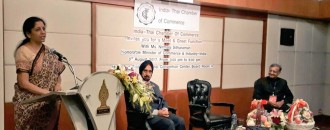
India, South Korea upgrade bilateral ties to ‘Special Strategic Partnership’
The Dollar Business Bureau  India and South Korea on Monday agreed to upgrade the bilateral relationship to a “Special Strategic Partnership”. The two sides have decided to renew the existing cooperation in the areas of defence, foreign affairs, trade and investment, science and technology, and regional cooperation. Indian Prime Minister Narendra Modi and Park Geun-hye, President of South Korea, also agreed for cooperation in many other areas. While President Park informed the Indian prime minister about his country’s Northeast Asia Peace and Cooperation Initiative (NAPCI), the latter welcomed South Korea’s desire to enhance cooperation and security among countries of the Asia-Pacific region. Both the sides agreed to work together and achieve shared goals through India’s Act East Policy and South Korea’s NAPCI initiative. In response to South Korean premiere’s interest towards Make in India, the Indian prime minister invited the Republic of Korea to become a privileged partner in the campaign. Towards cooperation in trade and investment, the two premieres directed their officials to hold discussions to leverage fully the potential of Comprehensive Economic Partnership Agreement (CEPA) between the two countries. Both the sides welcomed the revised Double Taxation Avoidance Agreement and the Prevention of Fiscal Evasion with respect to taxes on income. The ministry of strategy and finance and the Export Import Bank of Korea also expressed their interest to provide US$ 10 billion towards infrastructure cooperation, US $ 1 billion as Economic Development Cooperation fund and export credits up to US $ 9 billion for priority sectors, including smart cities, railways, power generation and transmission. Both the sides welcomed commencement of negotiations to amend the India-Korea CEPA by June 2016. For cooperation in the electronic manufacturing, both the countries have decided to set up an India-Korea Joint Working Group to facilitate business collaborations and technology transfer. The two sides also discussed cooperation in the steel sector, enhanced cooperation between the companies of two sides in ship-building industry, enhancing exports of fresh fruits and horticultural products, developing industrial parks, technology cooperation, and renewable energy projects. Electric power development and new energy industries, maritime cooperation, roads and infrastructure are the other areas in which MoUs were signed. The two countries also agreed to hold annual summits, joint commissions led by the foreign ministries, institutional partnership in defence education, and regular meetings between security councils to tackle internet related issues.
India and South Korea on Monday agreed to upgrade the bilateral relationship to a “Special Strategic Partnership”. The two sides have decided to renew the existing cooperation in the areas of defence, foreign affairs, trade and investment, science and technology, and regional cooperation. Indian Prime Minister Narendra Modi and Park Geun-hye, President of South Korea, also agreed for cooperation in many other areas. While President Park informed the Indian prime minister about his country’s Northeast Asia Peace and Cooperation Initiative (NAPCI), the latter welcomed South Korea’s desire to enhance cooperation and security among countries of the Asia-Pacific region. Both the sides agreed to work together and achieve shared goals through India’s Act East Policy and South Korea’s NAPCI initiative. In response to South Korean premiere’s interest towards Make in India, the Indian prime minister invited the Republic of Korea to become a privileged partner in the campaign. Towards cooperation in trade and investment, the two premieres directed their officials to hold discussions to leverage fully the potential of Comprehensive Economic Partnership Agreement (CEPA) between the two countries. Both the sides welcomed the revised Double Taxation Avoidance Agreement and the Prevention of Fiscal Evasion with respect to taxes on income. The ministry of strategy and finance and the Export Import Bank of Korea also expressed their interest to provide US$ 10 billion towards infrastructure cooperation, US $ 1 billion as Economic Development Cooperation fund and export credits up to US $ 9 billion for priority sectors, including smart cities, railways, power generation and transmission. Both the sides welcomed commencement of negotiations to amend the India-Korea CEPA by June 2016. For cooperation in the electronic manufacturing, both the countries have decided to set up an India-Korea Joint Working Group to facilitate business collaborations and technology transfer. The two sides also discussed cooperation in the steel sector, enhanced cooperation between the companies of two sides in ship-building industry, enhancing exports of fresh fruits and horticultural products, developing industrial parks, technology cooperation, and renewable energy projects. Electric power development and new energy industries, maritime cooperation, roads and infrastructure are the other areas in which MoUs were signed. The two countries also agreed to hold annual summits, joint commissions led by the foreign ministries, institutional partnership in defence education, and regular meetings between security councils to tackle internet related issues.
May 18, 2015 | 6:27 pm IST.


.jpg)



 to success.
to success.